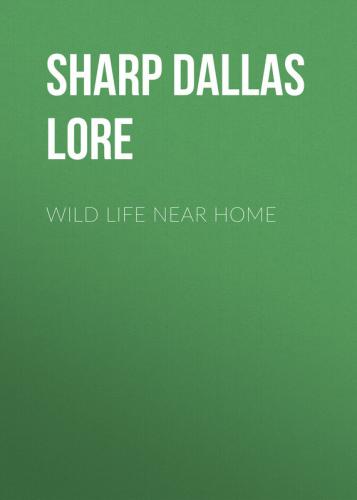Throughout southern New Jersey the pine-tree swifts abound. The worm-fences, rail-piles, bridges, stone-heaps, and, above all, the pine-trees are alive with them. They are the true children of the pines, looking so like a very part of the trees that it seems they must have been made by snipping off the pitch-pines' scaly twigs and giving legs to them. They are the aborigines, the primitive people of the barrens; and it is to the lean, sandy barrens you must go if you would see the swifts at home.
In these wide, silent wastes, where there are miles of scrub-pine without a clearing, where the blue, hazy air is laden with the odor of resin, where the soft glooms are mingled with softer, shyer lights, the swifts seem what they actually are – creatures of another, earlier world. When one darts over your foot and scurries up a tree to watch you, it is easy to imagine other antediluvian shapes moving in the deeper shadows beyond. How they rustle the leaves and scratch the rough pine bark! They hurry from under your feet and peek around the tree-trunks into your face, their nails and scales scraping, while they themselves remain almost invisible on the deep browns of the pines; and if you are inclined to be at all nervous, you will start and shiver.
The uncanny name "lizard" is partly accountable for our unpleasant feelings toward this really intelligent and interesting little beast. If he were more widely known as "swift," Sceloporus would be less detested. The z in "lizard" adds a creepy, crawly, sinister something to the name which even the wretched word "snake" does not suggest. "Swift," the common name in some localities, is certainly more pleasing, and, at the same time, quite accurately descriptive.
There is nothing deadly nor vicious, nor yet unlovely, about the swift, unless some may hate his reptile form and his scales. But he is strangely dreaded. The mere mention of him is enough to stampede a Sunday-school picnic. I know good people who kill every swift they meet, under the queer religious delusion that they are lopping off a limb of Satan. "All reptiles are cursed," one such zealot declared to me, "and man is to bruise their heads." The good book of nature was not much read, evidently, by this student of the other Good Book.
The swift is absolutely harmless. He is without fang, sting, or evil charm. He is not exactly orthodox, for he has a third eye in the top of his head, the scientists tell us; but that eye is entirely hidden. It cannot bind nor leer, like Medusa. Otherwise the swift is a perfectly normal little creature, about six inches long from tip to tip, quick of foot, scaly, friendly, wonderfully colored in undulating browns and blues, and looking, on the whole, like a pretty little Noah's-ark alligator.
On the south side of the clump of pines beyond Cubby Hollow is a pile of decaying rails where I have watched the swifts, and they me, for so many seasons that I fancy they know me. Dewberry-vines and Virginia creeper clamber over the pile, and at one end, flaming all through July, burns a splendid bush of butterfly-weed. The orange-red blossoms shine like a beacon against the dark of the pines, and lure a constant stream of insect visitors, who make living for the swifts of this particular place rich and easy while the attraction lasts.
Any hot day I can find several swifts here, and they are so tame that I can tickle them all off to sleep without the slightest trouble. They will look up quickly as I approach, fearless but alert, with head tilted and eyes snapping; but not one stirs. With a long spear of Indian grass I reach out gently and stroke the nearest one. Shut go his eyes; down drops his head; he sleeps – at least, he pretends to. This is my peace greeting. Now I may sit down, and life upon the rail-pile will go normally on.
Upon the end of a rail, so close to a cluster of the butterfly-weed blossoms that he can pick the honey-gatherers from it, – as you would pick olives from a dish on the table, – lies a big male swift without a tail. He lost that member in an encounter with me several weeks ago. A new one has started, but it is a mere bud yet. I know his sex by the brilliant blue stripe down each side, which is a favor not granted the females. The sun is high and hot. "Fearfully, hot," I say under my wide straw hat. "Delightfully warm," says the lizard, sprawling over the rail, his legs hanging, eyes half shut, every possible scale exposed to the blistering rays, and his bud of a tail twitching with the small spasms of exquisite comfort that shoot to the very ends of his being.
Конец ознакомительного фрагмента.
Текст предоставлен ООО «ЛитРес».
Прочитайте эту книгу целиком, купив полную легальную версию на ЛитРес.
Безопасно оплатить книгу можно банковской картой Visa, MasterCard, Maestro, со счета мобильного телефона, с платежного терминала, в салоне МТС или Связной, через PayPal, WebMoney, Яндекс.Деньги, QIWI Кошелек, бонусными картами или другим удобным Вам способом.
